Nov 2013 - three - abbey
Main menu:
- Home Page
- Abbey
- Apiary
- Documents
- Monastic
- Spirituality
- Apostleship of the Sea
- Homilies of Pope Francis
Nov 2013 - three
16. Pope Francis: Let anti-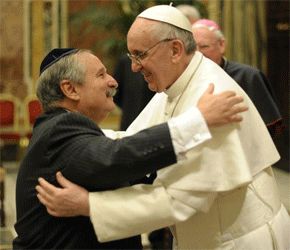 Pope Francis began by expressing his closeness to Rome’s Jewish community, which is the oldest in Western Europe, having a continued presence in the city of over two thousand years. “For many centuries…the Jewish community and the Church of Rome have lived in our city , with a history -
Pope Francis began by expressing his closeness to Rome’s Jewish community, which is the oldest in Western Europe, having a continued presence in the city of over two thousand years. “For many centuries…the Jewish community and the Church of Rome have lived in our city , with a history -
The Pope then turned to the occasion of the visit. The deportation of over one thousand Roman Jews on October 16, 1943, during the Nazi occupation of Rome. They were sent to Auschwitz, and only 16 ever returned to the homes. “We will remember in a few days the 70th anniversary of the deportation of the Jews of Rome. We will remember and pray for the many innocent victims of human barbarity, for their families,” said Pope Francis. “It will also be an opportunity to keep vigilant so that, under any pretext, any forms of intolerance and anti- “I've said it other times and I would like to repeat it now: It’s a contradiction that a Christian is anti-
“I've said it other times and I would like to repeat it now: It’s a contradiction that a Christian is anti-
“The vast majority were not aware of the need to update the Christian understanding of Judaism, and perhaps knew very little about the life of the Jewish community,” Pope Francis continued.
“But they had the courage to do what at that time was the right thing: to protect their brother, who was in danger. I would like to emphasize this aspect , because if it is true that it is important, on both sides, to study, in depth, theological reflections through dialogue, it is also true that there is a dialogue of life, that of everyday experience, which is no less important . Indeed, without this, without a real and concrete culture of encounter, which leads to authentic relationships, which exist without prejudice and suspicion, the engagement in the intellectual field would serve little purpose. Here also, as I often like to underline, the People of God has its own intuition and realizes the path God asks them to travel. In this case, the path of friendship, closeness and fraternity,” the Pope said.
Pope Francis concluded by mentioning his friendship with the Jewish community of Buenos Aires, and recalling that Christians and Jews have the Decalogue in common, to be used as a solid foundation and source of life for society, “so disoriented by an extreme diversity of choices and positions, and marked by a relativism which does not have many firm or safe points of reference.”
17. Pope meets with Jewish human rights group
In a meeting with a delegation from an international Jewish human rights organization on Thursday October 24, the Pope stressed that the problem of intolerance must be confronted. Several representatives from the U.S.-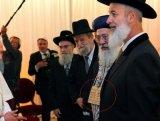 The Pope remarked that he has had several occasions in the past few weeks to restate “the Church’s condemnation of all forms of anti-
The Pope remarked that he has had several occasions in the past few weeks to restate “the Church’s condemnation of all forms of anti-
He made reference “with particular sadness” to the “suffering, marginalization and very real persecutions, which not a few Christians are undergoing in various countries”. He called on everyone to combine their efforts in favour of “a culture of encounter, respect, understanding and mutual forgiveness”, and underlined that education is of particular importance in the creation of such a culture.
He said this education should not only focus on the transmission of facts but on “the handing on of a living witness”, which presupposes “the establishment of a communion of life” and “a covenant with the coming generations, which is always open to truth”. He said young people must not only be conveyed a knowledge of the history of Jewish-
And it is here that a shared commitment to the service of society and to the weakest holds great importance, he added. He concluded by encouraging the Centre to transmit to young people “the importance of working together to reject walls and to build bridges” between the two cultures and faith traditions.
18. Pope Francis presents 2013 Ratzinger Prize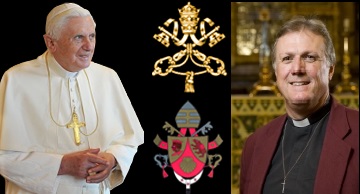
The recipients of this year’s Ratzinger Prize are: Christian Schaller, professor of dogmatic theology and deputy director of the Pope Benedict XVI Institute of Regensburg, Germany, which is publishing the complete works of Joseph Ratzinger, and Rev Canon Professor Richard Burridge, (Pictured with Pope Emeritus Benedict XVI) dean of King's College London and a minister in the Anglican Communion.
Burridge also participated this week in a symposium of the Joseph Ratzinger-
19. Pope suspends German bishop over financial scandal
Pope Francis was updated on Thursday October 17, on the latest in the scandal of a Catholic bishop in Germany who has come under fire for spending some 31 million euros ($42 million) on an ultra-
Pope Francis later suspended the German bishop from his diocese on Wednesday, October 23, after meeting with him personally and pending the outcome of a church inquiry into an alleged financial scandal. The Vatican didn't say how long 53-
An official communique issued by the Holy See Press Office, said “The Holy Father has been continually informed in detail and objectively on the situation regarding the diocese of Limburg. In the diocese, a situation has arisen in which Bishop Franz-
Following Cardinal Lajolo's 'fraternal visit' in September, the German Bishops' Conference, in accordance with an agreement between the bishop and the Chapter of Limburg Cathedral, has constituted a Commission to carry out a detailed examination of the matter of the building of the bishop's residence. Pending the results of this examination and of an analysis of responsibility for the matter, the Holy See considers it appropriate to authorise for Bishop Franz-
By decision of the Holy See, Stadtdekan Wolfgang Rosch is today appointed as vicar general, an appointment that had previously been announced by the diocese of Limburg as taking effect from 1 January 2014. Vicar General Rosch will administer the diocese of Limburg during the absence of the diocesan bishop, within the sphere of competence associated with this office”.
20. Pope Francis: A bishop is to serve, not dominate
In his homily Pope Francis said the bishop is like the head of the family, and should always have the Good Shepherd as an example. He also reminded the new Archbishops that their new position is one of service, not honor. “Always in service,” the Pope repeated. “Keep in mind that you were selected to serve, not to dominate.” He also said a bishop must be a man of prayer, because otherwise he will fall into worldliness.
He told them to love those entrusted to them like a father, to always respond immediately when a priest calls them. He said to do this also with the poor, the helpless, to those in need. He told them to pray also for those outside of the Church, because they are also entrusted to them.
21. Pope Francis: Arts express beauty of Church's Faith
Pope Francis on Saturday, October 19, greeted the “Patrons of the Arts” in the Vatican Museums. The group, which is dedicated to preserving the vast and unique collection of art housed in the Vatican Museums, was in Rome for the 30th anniversary of its founding. In his address, the Holy Father thanked the Patrons for their “outstanding contribution to the restoration of numerous treasures of art preserved in the Vatican collections and to the broader religious, artistic and cultural mission of the Museums.”
Pope Francis said, “In every age the Church has called upon the arts to give expression to the beauty of her faith and to proclaim the Gospel message of the grandeur of God’s creation, the dignity of human beings made in his image and likeness, and the power of Christ’s death and resurrection to bring redemption and rebirth to a world touched by the tragedy of sin and death.” The Vatican Museums, he said, “make it possible for countless pilgrims and visitors to Rome to encounter this message through works of art which bear witness to the spiritual aspirations of humanity, the sublime mysteries of the Christian faith, and the quest of that supreme beauty which has its source and fulfillment in God.”
Pope Francis concluded his address with the prayer that the patronage of the arts would always be a sign of “interior participation in the spiritual life and mission of the Church” and “an expression of our hope in the coming of that Kingdom.”
22. Pope sends video message in English to Philippines conference
Pope Francis on Friday October 18, sent a video message in English to participants at the conclusion of a conference in the Philippines organized by the archdiocese of Manila. The three day Philippine Conference on the New Evangelization has been focused on three main goals: creating an experience of God in the context of the new millennium, strengthening bonds of communion in the Philippine church, and inspiring the faithful to live by the spirit of mission.
Some five thousand delegates from across South East Asia have been taking part in the meeting which concludes on Friday with the papal message and a Mass celebrated by the nuncio to the Philippines, Archbishop Giuseppe Pinto.
The Pope’s message follows:
My dear brothers and sisters in the Lord Jesus Christ,
I greet all of you with the peace and joy of Our Lord. The first Philippine Conference on the New Evangelization is a worthy offering to the Year of Faith. For this I thank all of you, my brother Bishops, the priests, religious men and women, seminarians and the lay faithful who organized and are participating in the conference. I am happy to learn that you came to Manila from different parts of the Philippines and Asia. The Holy Spirit is actively at work in you. The Church of Christ is alive!
Through this conference, I hope you would experience again the loving presence of Jesus in your lives, that you would love the Church more and that you would share the Gospel to all people with humility and joy. Do not get tired of bringing the mercy of the Father to the poor, the sick, the abandoned, the young people and families. Let Jesus be known in the world of politics, business, arts, science, technology and social media. Let the Holy Spirit renew creation and bring forth justice and peace in the Philippines and in the great continent of Asia that is close to my heart.
Please pray for me. I promise to pray for you, especially to Our Mother the Blessed Virgin Mary, Star of the New Evangelization.
Mabúhay ang Pilipínas! Mabúhay ang Asia! Pagpaláin kayó ng Dios!
[Long live the Philippines! Long live Asia! God bless you!]
23. Pope Francis: The scandal of hunger & the globalization of indifference
October 16th is World Food Day and in a message to the UN’s Food and Agriculture Organization Pope Francis condemned the continuing scandal of hunger and malnutrition in today’s world and what he called a globalization of indifference towards it.
Pope Francis’s address was delivered by Monsignor Luigi Travaglino in a ceremony marking World Food Day at the Rome headquarters of the UN Food and Agriculture Organization. In his message the Pope criticized what he called "a growing tendency for us to close in on ourselves saying this leads to a certain indifference on both a personal, institutional and state level" towards hunger as though "it were an inevitable fact."
The Pope urged the international community to break down "the barriers of individualism and the slavery of profit at all cost," not just in human relations but also in the global economic and financial dynamics. In order to conquer hunger, he said, "we need to re-
As he has done in the past, Pope Francis criticized the fact that around a third of all food produced in our planet goes to waste and said "we need to modify our life styles including our eating habits." "This waste of food," he continued, "is one of the results of our throw-
The pope said this was "the sad sign of a globalization of indifference that is slowly making us get used to the suffering of others as though it were a normal thing." He concluded his message by calling for an education in solidarity and a lifestyle that overcomes our throw-
24. Pope Francis thanks Cardinal Bertone for years of service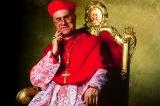
Pope Francis spoke briefly to thank Cardinal Bertone, saying, “[I]n teaching, in your ministry as diocesan bishop, and in your service in the Curia, including your service as Secretary of State, it seems that the fil rouge was constituted precisely by that Salesian priestly vocation, which has signed your life from earliest childhood, and which has brought you to carry out all of the assignments you have received, without exception, with profound love for the Church, great generosity, and with that typical[ly] Salesian mixture that unites a sincere spirit of obedience and a great liberty of initiative and personal inventiveness.”
The Holy Father concluded with expressions of gratitude to the whole Secretariat of State, asking everyone present for continued prayers and assuring them of his own.
25. Archbishop Parolin has pastoral approach, says cardinal
French Cardinal Jean-
Cardinal Tauran, currently president of the Pontifical Council for Interreligious Dialogue, worked with Archbishop Parolin in the Secretariat of State several years ago. The archbishop was then the cardinal’s Undersecretary for Relations with States for about four years. In an interview with Vatican Radio’s Hélène Destombes, the cardinal said: “He’s an excellent priest and I think he has great international experience. And he is young, so he could accompany the Pope in the reform of the Curia.”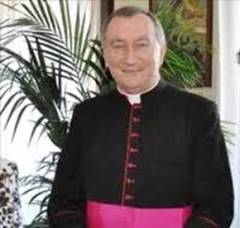 Cardinal Tauran described the new secretary of state as “very efficient”, “a good negotiator, very balanced” and “very realistic”. When asked if the archbishop’s appointment could be seen as a break with the “era of Cardinal Bertone”, the cardinal said the new 58-
Cardinal Tauran described the new secretary of state as “very efficient”, “a good negotiator, very balanced” and “very realistic”. When asked if the archbishop’s appointment could be seen as a break with the “era of Cardinal Bertone”, the cardinal said the new 58-
The cardinal also commented on Archbishop Parolin’s pastoral approach: “Diplomacy is at the service of pastoral work, and I think that this is something that Archbishop Parolin understood well and which he lives.” Cardinal Tauran said he “always appreciated (the archbishop’s) discretion, his great capacity for work.” The cardinal said he believes the new Secretary of State and the Pope have complementary personalities and will work well together. “I think so because they are two men who are very calm, who have an interior life, who do not allow themselves to be impressed by events,” he said. “Their temperaments go very well together, and I wish Archbishop Parolin much success in his new functions.”
Archbishop Parolin was born in Vicenza, Italy, and was ordained a priest in 1980. He has served in the diplomatic corps for the past 20 years, serving in the nunciatures of Nigeria and Mexico. In his diplomatic career, he was also involved in some delicate files, including reopening the dialogue between Israel and the Palestinians, relations between the Vatican and Vietnam, and Benedict XVI’s letter to Chinese Catholics. He was the apostolic nuncio in Venezuela, when Pope Francis announced his appointment as Secretary of State on August 31.